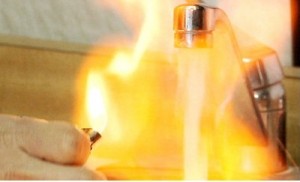News outlets began reporting Sunday night (July 1) that North Carolina governor Bev Perdue vetoed Senate Bill 820, which would have allowed energy companies to use a process known as hydraulic fracturing, a.k.a. fracking, to drill for natural gas in the state. Fracking is the technique of injecting drilling fluids composed of water, sand and toxic chemicals under intense pressure into shale or other rock formations, fracturing them and allowing the trapped natural gas to escape into the drilling casing.
Last Wednesday’s (June 27) Naturalist’s Corner noted just a few of the documented community tragedy’s from across the country that have resulted from fracking. Incidents like tap water catching on fire, wells exploding, noxious fumes etc. Also in last week’s column was the fact that the EPA, confronted with all of these fracking incidents from all across the country has regrouped and decided to take a more in-depth look at all the practices associated with fracking to better determine the risks involved and that the results of this study will be made public later this year. But it seems Republicans in North Carolina’s General Assembly feel it’s unwarranted to wait for the details of that report and are pressing ahead with a veto override vote perhaps before this column is published. There is hope that such an override vote would fall short as neither the House nor the Senate passed the legislation with a veto-proof majority.
Governor scores a perfect 10 on flip-flop
In today’s political arena nothing seems to echo better than “flip-flop.” And to be a flip-flopper is indeed the lowest of the low. Well it didn’t take long for the leaders of both the House and the Senate to declare that Perdue had flip-flopped. The reason for this assertion was, they said, the fact that the Governor had, in May, come out in support of fracking. Perdue is on record as noting that she could support fracking if it was done in an environmentally safe way and issued an executive order in May outlining an approach that she felt met those criteria. And why, then, did Governor Perdue flip-flop?
Well, according to the Charlotte Observer Perdue noted, “Our drinking water and the health and safety of North Carolina’s families are too important; we can’t put them in jeopardy by rushing to allow fracking without proper safeguards.”
There you have it – a perfect 360 degree, Olympic caliber flip-flop from supporting fracking if it could be done in an environmentally responsible way to vetoing Senate Bill 820 because of its lack of environmental safeguards. Now the Governor and I may disagree on whether, in fact, there is such a thing as “safe” fracking, but I certainly commend her for sticking by her original convictions that fracking should only be allowed in North Carolina if it could be proven to be safe and if there was adequate oversight in place.
And if calling someone a flip-flopper doesn’t do ‘em in you can pull out the ‘jobs killer” club to try and finish ‘em off, which is, of course, what Republican leaders tried to do. But what’s the scoop on these fracking boom jobs?
We can look to west-central Louisiana and the and the Haynesville shale one of the largest shale plays in the country and one of the first areas to experience the fracking boom. According to a report in the Huffington Post the number of natural gas rigs drilling in the Haynesville shale has dropped from more than 140 to around 40 in the last 18 months. Caddo Parish, which was riding high on the fracking boom saw an 18 percent decrease in sales tax revenue in 2011. And a survey by the Marcellus Shale Education & Training Center pointed out that 70 to 80 percent of the workers associated with the drilling in Pennsylvania were from out of state.
And while I believe Governor Perdue’s 360-degree flip-flop shows her commitment to the people, communities and environment of North Carolina, the performance of the oil and gas industry and their political cronies on the un-even parallel bars of bottom line versus community and environmental well being rate a goose egg on my score card.

